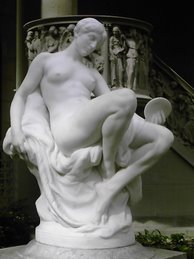The following is an email I sent to Craig Biddle, editor of The Objective Standard.
Hello Craig Biddle,
I received your renewal notice for The Objective Standard, and I plan to re-subscribe next month. But before I send my check, I want to lobby for the essays I would most like to read in this year’s issues, based on the list of “essays in progress” in the Fall 2007 edition.
First, I’d like to read B. John Bayer’s “New Atheists’ critique of religion.” I’ve read about the “new atheists” in mainstream publications and in Objectivist circles, including the Harry Binswanger List, and I’m eager to read a more thorough analysis of their ideas. With the rise of religion as a cultural and political force and our battle against it, Americans need to understand the fundamental distinctions between the new atheists (i.e., Christopher Hitchens, Richard Dawkins, Sam Harris) and other non-believers such as Ayn Rand and Objectivists. I expect Mr. Bayer’s essay would explore these important distinctions, as well as the new atheists’ recognition, or lack thereof, of Miss Rand and Objectivism.
I’d also like to see Alan Germani’s review of Bradley Thompson’s book “Anti-Slavery Political Writings” printed in TOS sometime soon. I was motivated to pick up this book because I have learned little about the American abolitionists, and I’m interested in discovering who they were and what fundamentally inspired their pro-freedom cause. (While reading Thompson’s introduction, I was surprise by the depth of statism exhibited by the pro-slavery side prior to the Civil War.) I particularly enjoy book reviews, and especially those on books I’m reading at the time, so Mr. Germani’s review is of particular interest to me.
Next, I’d like to read Lisa VanDamme’s essay on literature. I learned a lot from her previous contributions on education in TOS, and I’ve read some of the children’s novels she had referenced. In recent years, I’ve returned to reading more fiction, particularly classic novels, so I’m anticipating her essay devoted exclusively to literature—and hope to come away with another list of novels to read, along with a better knowledge of how to get the most out of them.
Lastly, I’m intrigued by Gena Gorlin’s look at the psychology of a genius such as Isaac Newton. As a fan of a philosophical genius, Ayn Rand, I’ve been fascinated reading about how a highly intelligent individual functions, both morally and psychologically, in the particular times they inhabit. I already know Miss Rand’s story, so I’d like to read more about how another genius, Newton, functioned in his field during an earlier era.
I hope you will consider my preferences for essays when you decide on the submissions you will publish in TOS in 2008.
Thank you,
Joseph Kellard
TOS Subscriber
Joseph Kellard is a journalist and columnist living in New York.
Please post comments about this article. For inquiries about Joseph Kellard’s writing services, email him at: Theainet1@optonline.net.
Tuesday, January 22, 2008
Subscribe to:
Post Comments (Atom)































+-+June+2009.jpg)











2 comments:
"(While reading Thompson’s introduction, I was surprise by the depth of statism exhibited by the pro-slavery side prior to the Civil War.)"
You might find Slavery Defended: The views of the Old South to be intriguing. The editor, Eric L. McKitrick, assembled for this 1963 book a collection of essays written by Southerners who defended slavery before the U. S. Civil War.
They advocated: a sort of plantation socialism; a forceful "solution" to class-conflicts; the labor theory of value; attacks on "wage slavery"; and rejection of the "exploitations" of industrialization. They offered all of that before Marx. Some also suggested expanding chattel slavery to include Amerinds and some whites.
McKitrick notes, on p. 2, that these pro-slavery thinkers developed their ideology and, to some extent, their worldview in response to criticisms by abolitionists. This is one more bit of proof that ideas matter. Slave owners had total power, but they were afraid of the idea of freedom and had to counter it with other fundamental ideas.
Burgess,
Thank you for your reply to my post and for your book recommendation.
Here is one quote from Thompson's anthology that confirms what you wrote:
"Your whole class of manual hireling laborers at the North, and your 'operatives,' as you call them, are essentially slaves." -- Mr. Hammond, of South Carolina, Speech in Congress
Also, I just want to clarify that this and many other anti-freedom, pro-slavery quotes appear in the first essay of the anthology, not in its introduction, as I incorrectly wrote in my post.
~ Joseph Kellard
Post a Comment